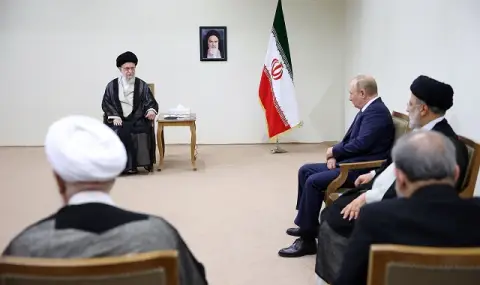With the signing of the Comprehensive Strategic Partnership Agreement, Russia and Iran are turning a new page in their relations, especially in the field of trade, Iranian President Masoud Pezeshkian said, quoted by Reuters, BTA reports.
Pezeshkian and Russian President Vladimir Putin said that the two countries will strengthen their cooperation in a number of areas, including politics, security, trade, transport and energy.
Moscow and Tehran are discussing supplies of Russian gas, Putin said at a press conference with Pezeshkian. The Russian president said that if the project is implemented, gas supplies to Iran could reach 55 billion cubic meters per year, but they will start with small volumes - up to 2 billion cubic meters. m.
The 55 billion cubic meters are roughly equal to the volumes that were delivered to Europe via the Nord Stream 1 gas pipeline before it was damaged by explosions in 2022, Reuters notes. The agency notes that Russia is looking for new buyers for its gas after losing its dominance in the European market as a result of the war in Ukraine.
Pezeshkian said that the two countries will have to pay attention to some technical issues.
Russia regularly informs Iran about the current situation in the Ukrainian conflict, Putin said at the press conference. He stressed that the countries have long coordinated their efforts in the international arena on "the most pressing issues that are part of the international community's agenda", TASS reported.
This includes both the Middle East and the South Caucasus - problems that "directly affect our interests", the Russian president noted.
Russia is considering building new nuclear reactors in Iran, Putin added.
"We have a huge project in nuclear energy. One power unit is already operating successfully. Now we are discussing the possibility of building additional units," the Russian president emphasized.
The text of the signed agreement also provides for Russia and Iran to strengthen their cooperation in the field of security and defense. It provides for consultations and cooperation to address military and security threats, as well as participation in joint military exercises on or outside their territory.
In the event of an attack by a third party against Russia or Iran, the other party undertakes not to provide any military or other assistance to the aggressor that would contribute to the continuation of the aggression. Instead, the other party will assist in resolving any disputes that arise on the basis of the UN Charter and other applicable norms of international law.
In addition, Moscow and Tehran undertake not to allow their territory to be used for hostile actions against the other party, nor for "supporting separatist movements and other actions that threaten stability and territorial integrity" to the other side.
"The contracting parties shall pursue a state policy based on mutual respect for national and security interests, the principles of multilateralism, peaceful settlement of disputes, rejection of unipolarity and hegemony in world affairs, and shall oppose interference by third parties in the internal and foreign affairs of the contracting parties", the treaty, quoted by TASS, emphasizes.
